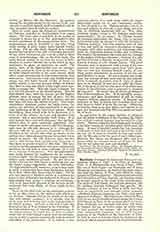

Hontheim (FEBRONIUS), JOHANNES NICOLAUS VON, auxiliary Bishop of Trier; b. at Trier, January 27, 1701; d. at Montquentin, near Orval, September 2, 1790. The son of Karl Caspar von Hontheim and of Anna Margareta von Anethan, he received his early education from the Jesuits of Trier, with whom he subsequently had little sympathy. He afterwards attended the Universities of Trier, Louvain, and Leyden, where he devoted himself to the study of law and theology. The works of Van Espen, the Louvain professor, and his Gallican doctrine influenced him greatly. He became a doctor of law at Trier in 1724, and then made an educational tour through various countries—Holland, Belgium, Germany, and Italy—and spent three years in Rome. Having become a priest May 22, 1728, he was received without delay among the Canons of St-Simeon at Trier, in the prebend which his uncle, Hugo Frederick von Anethan, had given him when he reached the age of twelve years, at which time he had received the tonsure. He also discharged other ecclesiastical functions, and in 1732 became professor of the Pandects at the University of Trier. In 1738 he went to Coblenz where he discharged the duties of official and president of the Grand Seminaire of that city. He left Coblenz in 1747 on account of ill-health, and returned to Trier, where he became in 1748 dean of the chapter of St-Simeon, auxiliary bishop, and vicar-general. He received episcopal consecration at Mainz, February 16, 1749, with the title of Bishop of Myriophytos (Greece) in partibus infidelium. To these already absorbing duties he added those of vice-chancellor of the university. In 1763 he published his famous work “Justini Febronii jurisconsulti de statu Ecclesiae et legitima potestate Romani pontificis liber singularis”, which aroused so much controversy (see Febronianism).
In 1778 he asked and received the nomination of a second auxiliary bishop, and in the next year, on April 21, resigned his duties as dean of the collegiate church of St-Simeon. It was not until two years before he died that he renounced with complete sincerity his erroneous doctrines. He was a man of short stature, energetic, hard-working, pious, and generous. His great fault was to have upheld and propagated Gallican doctrines in Germany. Apart from several juridical dissertations and lectures—e.g., “De jurisprudentia naturali et summo imperio” (1724); “Normae studiorum pro universitate Trevirensi et gymnasio Confluentino” (1751); “Arguments psalmorum et canticorum” (1759)—his principal works are “Historia Trevirensis diplomatica et pragmatica” (3 vols., Augsburg, 1750); “Prodromus historiae Trevirensis” (2 vols., Augsburg, 1757), and his works on the constitution of the Church: “De statu ecclesiae”, mentioned above, and its successive editions (1763-70) and supplements (II, III, IV, the last in 2 parts, 1770-74); “Justinus Febronius abbreviatus et emendatus” (Cologne and Frankfort, 1777); “Justini Febronii commentarius in suam retractionem” (Frankfort, 1781). The city of Trier possesses an unedited work by him, viz. the “Historiae scriptorum et monumentorum Treviren. amplissima collectio”.
A. VAN HOVE

